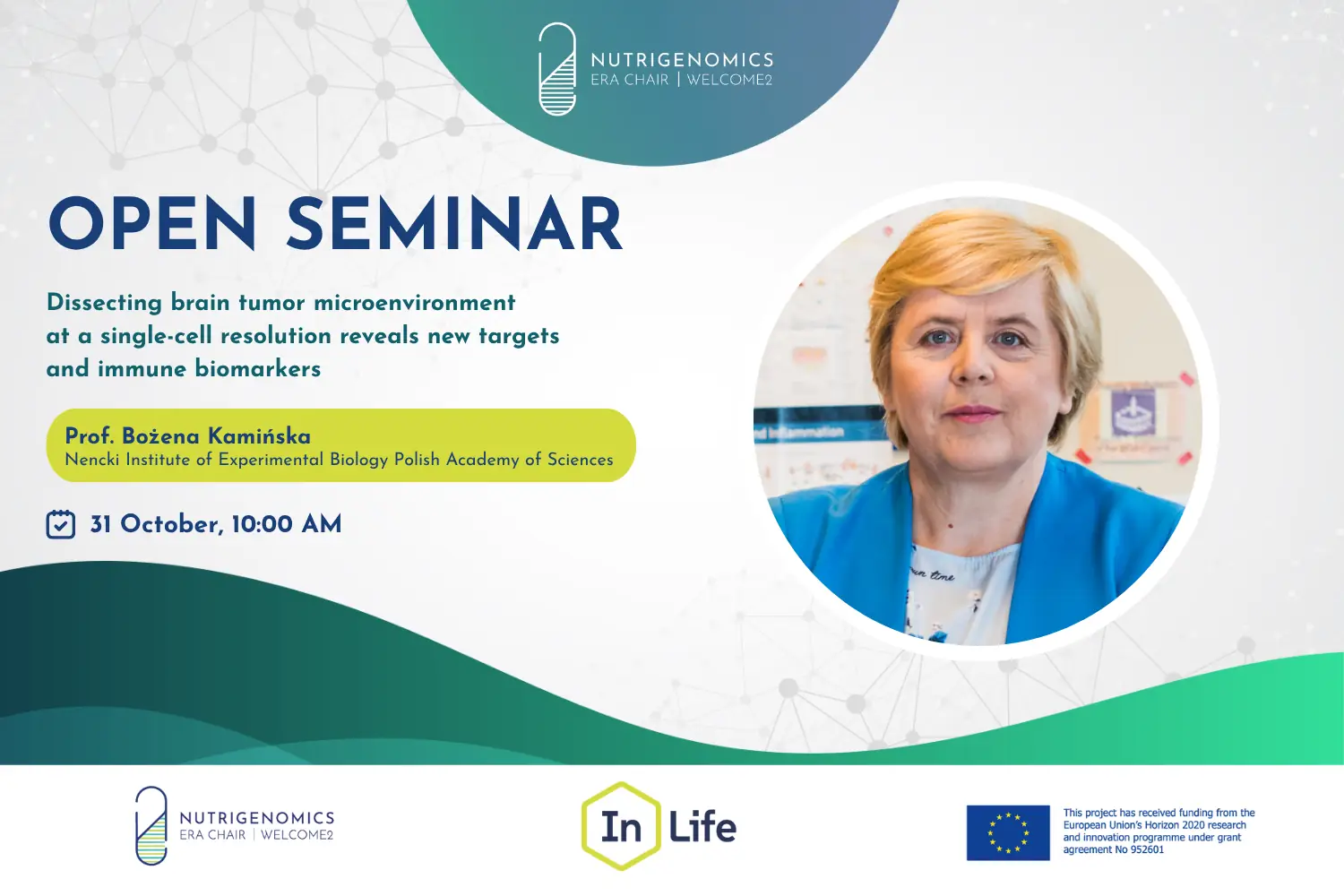
Prof. Bożena Kamińska from the Laboratory of Molecular Neurobiology, Nencki Institute of Experimental Biology Polish Academy of Sciences, will be the guest of the upcoming Open Seminar organized within the WELCOME2 ERA Chair project.
Seminar Title: Dissecting brain tumor microenvironment at a single-cell resolution reveals new targets and immune biomarkers
Date & Time: 31 October, 10:00 AM
Place: Institute of Animal Reproduction and Food Research PAS in Olsztyn, 18 Trylińskiego St., Conference Room “SKANDA”
We look forward to seeing you there!
Abstract of the presentation:
The tumor microenvironment (TME) plays important role in tumor endurance and response to therapies. TME of malignant brain tumors (gliomas) is characterized by a large diversity of different cell types, including endothelial cells, neurons, astrocytes, and a variety of immune cells such as microglia, tumor-associated macrophages, and tumor-infiltrating lymphocytes and various non-cellular components.
Advancements of single-cell and spatial transcriptomics provide powerful means to systemically profile the TME at a single-cell resolution, revealing the phenotypes and functionalities of disease-specific cell populations. Human tumors have different genetic alterations and consequences of those alterations on the immune TME and host immunity are poorly known. We used Cellular Indexing of Transcriptomes and Epitopes by Sequencing (CITE-seq) to identify cells/functionalities in experimental gliomas with various genetic alterations: the mutated NRAS or overexpression of PDGFB and different IDH1 status (wild type of mutated). IDH1 mutations are among the initial events in tumorigenesis and mutant IDH1 enzymes via the production of the oncometabolite 2-hydroxyglatarate (2-HG) exert pronounced effects on the immune composition of TME. Computational analysis revealed the presence of 34 immune cell clusters in tumors and various abundance of specific cells/states in TME of gliomas with distinct genetic alterations. IDH1 mutant gliomas have less cytotoxic T lymphocytes than wild type gliomas, and we noticed the inhibition of cell cycle processes in T cells suggesting deeper immunosuppression in those gliomas. The observed differences were validated by flow cytometry and immunocytochemistry. The experimental tumor models revealed mechanisms of immune dysregulation and defined new targets for immunotherapies. We found that tumor-secreted SPP1 (secreted phosphoprotein 1) a ligand of integrins drives reprogramming of immune cells, formation of aberrant tumor vasculature and a “cold” TME. We had developed synthetic peptides that block SPP1-integrin interactions and reprogramming of myeloid cells. The 7aaRGD peptide efficiently blocked microglia-dependent invasion of glioma cells in vitro, prevented the emergence of protumoral myeloid cells and normalized peritumoral vasculature. Combining 7aaRGD with anti-PD-1 antibody reduced tumor growth, expanded proliferating, interferon-ɣ producing CD8+T cells and reduced T regulatory cells. Transcriptomic profiles of myeloid cells after the combined treatment suggested the emergence of the “hot” inflammatory TME and augmented immune responses. Intratumorally delivered 7aaRGD similarly modified the TME of human U87MG gliomas in immunocompromised mice. We developed a series of humanized SPP1-integrin blocking peptides that reduced invasion of glioma cells in vitro. The leading candidate I49 blocked glioma growth in vivo when delivered intratumorally. We propose that combining the integrin blockade with immune checkpoint inhibitors would improve immunotherapy outcomes in brain tumors and other cancers.
About the speaker – prof. Bożena Kamińska
Prof. Bożena Kamińska is a distinguished neuroscientist and molecular biologist, internationally recognized for her research on brain tumors and immune responses in the central nervous system.
She is head of the Laboratory of Molecular Neurobiology at the Nencki Institute of Experimental Biology of the Polish Academy of Sciences in Warsaw, Poland. She obtained her PhD in biochemistry at the Nencki Institute in 1991 and after postdoctoral training at the Mc Gill University in Montreal, Canada, she become a full professor in 2003. From 2009 to 2023 she was the director of the Postgraduate School of Molecular Medicine at the Medical University of Warsaw. She was a visiting researcher at the Brain Research Institute at UCLA in Los Angeles, USA (2001-2002) and the Nanshan Scholar visiting professor at the Medical University of Guangzhou, China (2019-2022). She is an elected member of the Polish Academy of Sciences (since 2016) and European Molecular Biology Organization (since 2022).
She received a prestigious Foundation for Polish Science Award 2021 in life sciences, the Prime Minister Award for scientific achievements (2022) and was nominated by NCN for AcademiaNet – Expert Database for Outstanding Female Scientists and Scholars.
She specializes in molecular neurobiology, tumor immunology, neuro-oncology and neuroimmunology, with focus on functions of myeloid cells in pathological processes. Prof. Kaminska’s lab employs multidisciplinary approaches combining in vivo experiments in rodent models of human pathologies and in vitro experiments in primary cultures, brain slices and human induced pluripotent stem cell organoids. She has pioneered single-cell omics studies of brain tumor microenvironment in experimental gliomas. In recent years her group has been exploring transcriptional and epigenetic mechanisms in microglia in response to environmental exposures and experience.
She promoted 38 PhD students and 15 Master students.